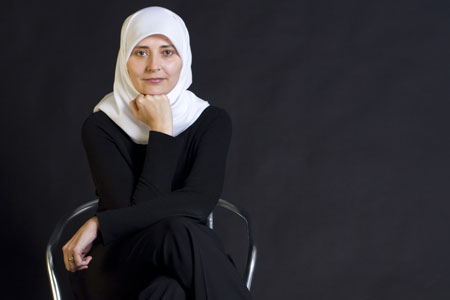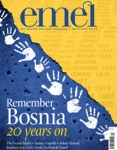
Faith in Diversity
Issue 91 April 2012
It was 1988, and I had recently become a Muslim. I was on the lookout for someone else “like me”, a fellow convert, but they were difficult to find back then. In the mosque one day I spotted a woman. She was tall, and was wearing a pink tracksuit. Her scarf was tied under her chin, but it did not conceal her blond hair. Her vivid blue eyes looked out from her pale face. I approached her, and we struck up a conversation. Eventually I got to the question, “So when did you convert to Islam?” I asked her. “I’m not a convert,” she replied, “I’m from Yugoslavia.” This piece of information did not help me, and so I persisted. She became rather exasperated at my inability to compute what she was saying, “My ancestors have been Muslims for 700 years!” she exclaimed.
I was really confused. This was the first time I had heard about indigenous Muslims in Europe. Everyone I had met up to this point was South Asian, Arab, or occasionally I met a convert like myself; and even we converts lived like South Asians and Arabs. Yet, here was this woman for all intents and purposes a westerner, telling me that her people had been Muslims for hundreds of years. I don’t think I fully grasped what she explained to me that day...until the war in 1992.
By this point, pictures of white western Muslims were beamed onto TV screens. Emaciated men were detained in camps, women and girls were being raped, the international community seemed impotent to help, and my own government imposed an arms embargo that so obviously meant that one side did not have the means to defend themselves. Words like ‘genocide’, ‘concentration camps’, and ‘ethnic cleansing’ were thrown around, and people wondered how this could be happening in Europe when there had been a promise of “Never Again”.
It was during this period, I began to understand the idea that it was acceptable to be English and Muslim. Up to this point, Islam was a very foreign matter, and I practised it through the prism of other people’s culture. That culture was rich and beautiful, but it wasn’t mine. I now had the confidence to build a uniquely British expression of Islam, whilst keeping true to the universal values, morals and ethics that transcend not only cultures, but time and space.
The greatest lesson from Bosnia is that unity and cohesion cannot be born of totalitarianism and illiberalism. Marshall Tito’s authoritarian Communist regime ruled the former Yugoslavia. It forcibly unified the varying ethnicities and religions of the region; promoted only docile and sycophantic individuals that were no threat to Tito, and purged all dissent. Whilst milder than its Communist Russian counterpart, it did not nurture the heart and soul of the people. It did not allow them to see the beauty of the diversity of one another. Rather, it sought to impose uniformity and conformity. When the regime fell, so did the facade of unity.
Totalitarianism removes the heart and spiritual space needed to build respect based upon diversity, and recognition of our common humanity. When we are able to see this humanity, even though we might not be of the same religion, colour, ethnicity, or culture, we can build. When we recognise the Divine creation manifest in another, then we can love. Conversely, the dehumanisation of another leads only to death
and destruction.
True unity, genuine cohesion, can only be born when we respect and love each other—not despite our differences, but because of our differences, for diversity is a manifestation of the Creator’s Will. As the Qur’an reminds, “Had thy Sustainer so willed, He could surely have made all mankind one single community: but He willed it otherwise, and so they continue to hold divergent views.” (11:118)
Communism calls to a certain idealism. A unity of man based upon a classless social order with the common ownership of the means of production. Fascism calls to a certain idealism. A unity of man based upon supra-personal connections of ancestry, culture, and blood. But both lack the depth of heart and spiritual imperative that sees the Divine visible in another. Both reduce humanity to the material, to the physical, and stay in power through force. Faith in God transcends the material, and can only be truly explored through freedom of choice as an expression of our God-given free will.
Tito’s Yugoslavia maintained unity by suppressing diversity. This led to wholesale bloodshed and carnage when that suppression was no longer intact. A bland monolithic culture is not natural or beautiful to withhold. A bland monolithic expression of Islam, dependent upon a religious police to enforce, would be a shameful disservice to the breadth and depth of the Divine message. Rather, we should seek to surrender to the Divine Will, and to want for all our brothers and sisters in humanity what we want for ourselves, namely peace, security, respect, dignity, and contentment of heart.
Bookmark this |
|
Add to DIGG |
|
Add to del.icio.us |
|
Stumble this |
|
Share on Facebook |
|
Share this |
|
Send to a Friend |
|
Link to this |
|
Printer Friendly |
|
Print in plain text |
|


Comments
0 Comments